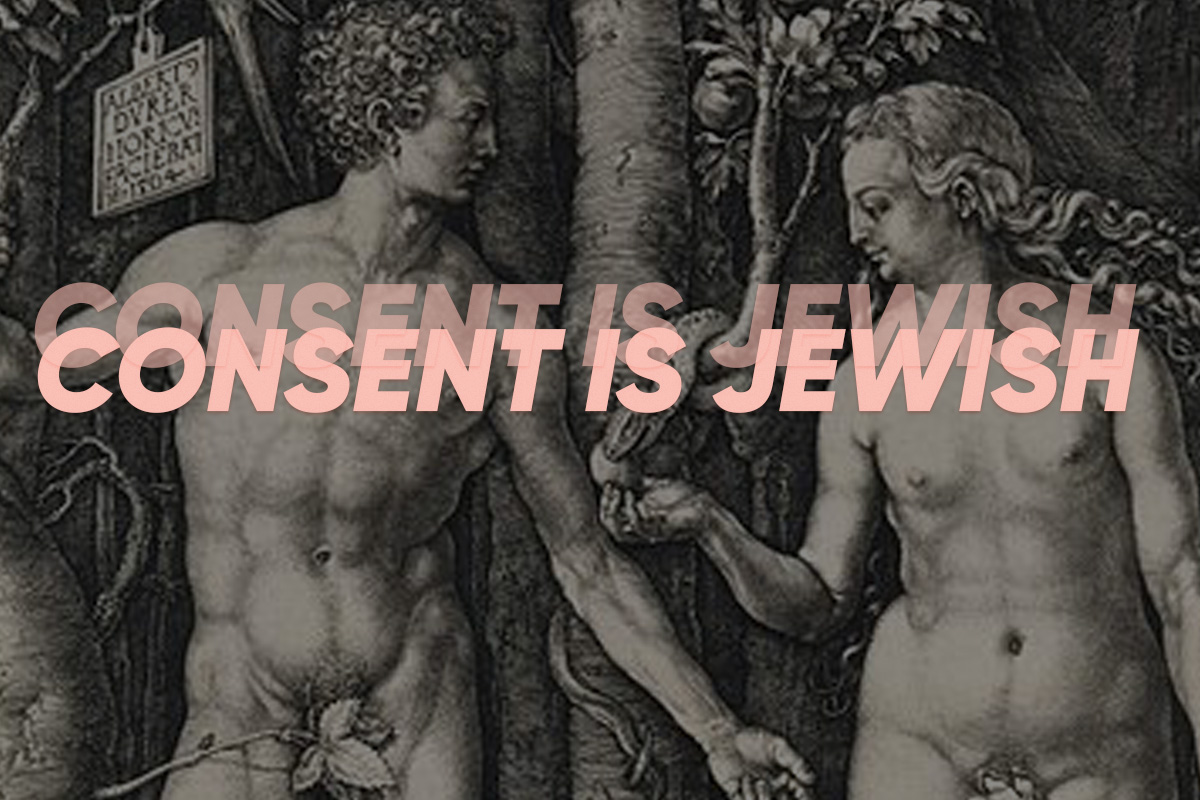While reporting on Harvey Weinstein’s years of sex abuse last winter, Merissa Nathan Gerson became obsessed with the idea of consent. Specifically, consent in Jewish law.
Hundreds of years ago, rabbis wrote in the Talmud that if a man rapes a virgin, he has to pay her a fee of 50 shekels. So according to Jewish law, Weinstein owes over 40,000 shekels to the tens of women (not necessarily virgins) who’ve accused him of rape.
More importantly, the Talmud says that in order to give consent, a woman has to explicitly say “yes” to sex. If she’s silent, it doesn’t count. Consent as a core Jewish value is at the center of Ken Means Yes, Gerson’s latest campaign for sex and consent education in the Jewish world. (Ken means yes in Hebrew, fyi.)
Building off Gerson’s ELI Talk exploring the lack of sex education in Jewish-American communities, the campaign’s goal is to start a dialogue about consent. On Yom Kippur this year, rabbis across the country will read this script to their congregations to re-educate everybody about healthy, consensual sex.
We caught up with Gerson to learn more about her campaign, the holes in American Jewish sex education, and her old sex column, Ask Your Yenta.
How does the Talmud discuss consent?
Across the board, the rabbis talk a lot about pleasure and making sure a woman is satisfied. Of course, this is in terms of the binary, monogamous, heterosexual woman. The Talmud tells men not to leave a woman alone for too many months without giving her conjugal rights, to make sure that she initiates sex, and that she’s always wanted when she asks for it.
When it comes to rape, it talks about nuances that are really important. Like, if she’s afraid, do not proceed. That’s not something that we teach in biology class: don’t proceed if someone’s frightened, don’t proceed if you can’t tell if she said yes, don’t proceed if you’re filled with hatred. Intention is really important. You can’t go towards someone to get your anger out on their bodies. These are just really vital lessons that the United States doesn’t include in sex education.
How did consent as a core Jewish value get left out of American Jewish education?
My personal theory is that the Talmudic law, the Dina de-Malkhuta Dina, the law of the land, says that we’re obligated to assimilate to the country we live in as well as their cultural values. So, when we emigrated from Europe to America, Jews entered a sexual scene that was very much not talking about the body or open expressions. So, we didn’t learn about sex or consent in Hebrew school because we were adapting ourselves wisely in terms of our safety to the puritan aspect of the United States.
How did community leaders react to reading the consent script?
Most of them are really excited! The only rabbis I reached out to who’ve said no were those who religiously aren’t allowed to change the liturgy of the prayers, or those with enormous congregations where it’d be a bureaucratic issue.
How many congregations will hear the script on Yom Kippur?
Rabbis will read the script to congregations in Oregon, Illinois, London, Washington D.C., Massachusetts, California, and Kentucky. I’ll be reading a script at Georgetown University Center for Jewish Life. I was actually born at Georgetown University Hospital, but that’s just a coincidence.
Do you think Harvey Weinstein and the men of #MeToo can atone for their sexual abuse?
There have been no visual signs that Harvey Weinstein has even taken full responsibility for his actions, so I’m not concerned about whether we accept him. The personal work of atonement is between each rapist and himself. What we get to do as a community, though, is to acknowledge that this guy represents us in some weird, warped American way, and we can ourselves be responsible for learning from his mistakes. That’s our power. We’re not responsible that he messed up. He’s responsible for himself and his lack of self-control, and for not taking care of his illness for a long time ago. That violence is on him.
We as a community can stand up today, tomorrow, and for the rest of our lives and make sure that we teach our kids not to be like Harvey Weinstein. Let’s make sure we start now by giving men the power within themselves to get help when they need it. We have a great gift right now to use this moment to teach our children how to prevent this as best we can.
I know that our job as the Jewish people is to ignite the light of the nation. If we have a member of our community that is scorching the lights of women left and right like Harvey Weinstein did, well, we have to make up for it. And we’re going to light as many torches as we can, for love and for safety.
What was the most frequent Ask Your Yenta question people submitted?
There were a lot of questions about shame and allowance. “Is this acceptable? Is this Okay? Am I allowed?” What I learned is that people have every right to take full responsibility for their own pleasure and to discuss it without shame. Someone once asked me if it was okay if her boyfriend liked to wear a sock on his genitals while they made out, and I was like, “That’s fine! Do what you need to do, as long as you’re comfortable and it doesn’t make you feel frightened.”
Background image in header: Adam and Eve (Engraving, 1504) by Albrecht Dürer



